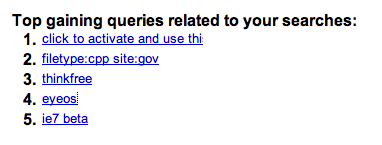Google's Attention Plans
One of the things that keeps coming up in conversations is this little feature buried deep in Google's personalized search. Assuming you have a Google account when you go to Google.com you should see a link in the top right corner that says "search history," click it. That is a saved archive of Google searches you did while signed in. That's not really what we're interested in, though. In the lefthand nav you should see a link that says "Trends." Click that. Now we're getting somewhere. What you should be looking at are some charts and graphs that describe how you use Google. Again, while interesting, not exactly what we're looking for at the moment, that is until you scroll down to the bottom of the page. Where you should see this:

"Top gaining queries related to your searches" seems innocent enough, until you really start to think about what that is. Google is taking all my search data, comparing it to everyone else's search data and making recommendations on other searches I may find interesting. That's some pretty badass collaborative filtering.
Think about that power for a second? How many people use Google? How many searches do they do? When you start to think about the mass it has some pretty amazing potential and may just speak to some future plans of Google. After all, helping you wade through the information you're bombarded with everyday certainly seems to fall under the category of "[organizing] the world's information and [making] it universally accessible and useful". This, by the way, is the definition of attention data. Google is recording what you spend attention to on their site, it's not so complicated when you can see a simple example like this.
Now for the downside, you don't own a bit of it. Yeah you have to sign in to get it, but it's not yours to keep. You can't share that information with Yahoo! and see what you have in common with searchers on that engine. Nope. It's stuck.
That, of course, is where AttentionTrust comes in. They believe, and rightly so, that you should own your own data. What you put in, you should be able to take out. If you want to take your Google searches and share them with Yahoo!, why should anyone stop you? Their recorder allows you to save a local copy of all your online clicks and keep it for a time when you might want to share it with someone else.
Unfortunately there aren't that many options for gaining serious value from your data yet. Root is working on some visualizations and exchanges that are starting to tap into the power of your data and Steve Gillmor is taking a different tack with Gesture Bank. But neither are there yet (which isn't necessarily a bad thing).
The point is, to understand attention you have to look elsewhere. To sites like Last FM who record all the songs you listen to and offer lots of services around that data (here's my page if you're interested).
Anyway, the real point of this post was to share that Google thing and now I'm rambling, so I'm going to bring it to a close.
Thoughts?